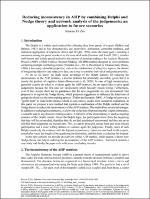Chapter Reducing inconsistency in AHP by combining Delphi and Nudge theory and network analysis of the judgements: an application to future scenarios
Abstract
The Analytic Hierarchy Process (AHP) is a Multi-Criteria method in which a number of decision factors (typically criteria and alternatives) are compared pairwise by one or more experts, using the Saaty scale, with the goal of sorting the alternatives (Saaty, 1977; 1980). For group AHP the Delphi method can be used in parallel with the AHP (Di Zio and Maretti, 2014), and this allows the search for a consensus on each pairwise judgement. A big issue of the AHP regards the inconsistency of the pairwise comparison matrices and here we propose a new method to reduce the inconsistency. As a solution we exploit the Nudge theory (Thaler and Sunstein, 2008) and from the second round of the Delphi survey, we calculate and circulate a Nudge to “gentle push” the experts towards more consistent evaluations. Furthermore, we propose the representation of the AHP matrices through graphs. In a direct graph two nodes are linked with two direct and weighted edges (or one edge with the direction based on the weights), where the weights indicate the evaluation given by an expert or, for a group, the geometric mean of the judgements. This type of visualization facilitates the reading of the results and could also be used as real-time feedback in the Delphi process, by displaying on the edges also a measure of variability. An application is proposed, on the evaluation of four future scenarios on the regulation of genetic modification experiments, assessed by a panel of 27 experts according to different criteria (plausibility, consistency and simplicity). The application demonstrated that it is possible to: a) reduce the inconsistency; b) collect useful textual material which enrich the AHP itself; c) use the inconsistency index as a stopping criterion for the Delphi rounds; d) display the pairwise comparison matrices with graphs.


 Download
Download Web Shop
Web Shop